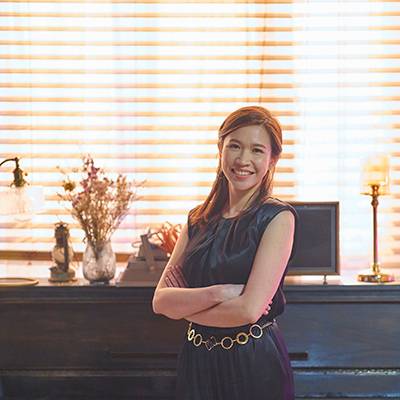Stephanie is a doctoral student from Hong Kong. She is studying for a PhD in Music Education and is expected to graduate in 2025.
What is your thesis about?
My thesis concerns the development of primary teachers’ identities in Hong Kong. It examines specialist music teachers’ agency and identity negotiation.
The study adopts a multiple case study approach that aims to understand the impact of the Hong Kong teaching and learning context, but also examine music specialists’ agency and identity negotiation within their specific teaching contexts.
What inspires you about your field of study?
Trained as a classical pianist, I have been labelled as a musician since I was young. My musical journey began when I was 4 years old, when my mother enrolled me in one-to-one piano lessons in a well-known music centre in Hong Kong. I cannot recall much of my earliest music-making on the piano, but I remember I was surrounded by music in childhood.
As I developed the satisfaction and sense of achievement from learning music I decided to pursue music professionally and study at undergraduate level. At that point, everyone needed to choose a focus. As a self-recognised performing musician, I wanted to participate in the performance stream of my degree. However, I did not perform well in the audition and failed in that aspiration. That was the first time I experienced conflict in my musician identity. I started to question if I was a good musician and thought I might seek to do something else.
Given my passion in teaching and working with children, I became interested in music education. That was when a teacher identity emerged. After graduation, I applied for the IOE’s Music Education MA. After the MA, I returned to Hong Kong and started teaching as a primary school teacher for three years before pursuing a doctorate at UCL. As a classically trained musician, I have often struggled as I navigated identities as a musician, music teacher, English teacher, teacher, or as a researcher in a school context. My personal story as a musician and teacher in Hong Kong intrigues me. I am interested to explore the complexity of how an individual musician develops identities and how these often shift within the music and music education profession.
Why motivated you to pursue a doctoral degree and what were you doing before this?
Pursuing a doctoral degree at IOE, a faculty that has been ranked World No. 1 for 9 years in a row in the QS World University Rankings, has always been my goal since I was a music education undergraduate in Hong Kong. My biggest motivation to pursue a doctoral degree was to prepare myself for a future career in Higher Education.
After graduating from IOE’s MA Music Education in 2018, I returned to Hong Kong and worked as a primary school teacher for three years before I embarked on my journey as a UCL doctoral student. I have a real passion for teaching students of all ages. I have had a role as a Postgraduate Teaching Assistant (PGTA) at UCL this year, which has has further re-affirmed my desire to pursue a career in Higher Education.
What will your next ventures be career-wise? Any goals on your 'bucket list'?
After passing my upgrade viva in June 2022 and finishing my current contract as a Postgraduate Teaching Assistant, I will be seeking more Higher Education teaching and research opportunities in both the UK and Hong Kong. I will also be doing more training in research methodologies. There have been lots of great opportunities at UCL and I am keen to build on them.
Has there been an element of the doctoral programme that has impressed you or been particularly valuable?
The huge diversity of research areas at IOE has been highly valuable. As a music education researcher, I have found it enormously beneficial to network and communicate with other doctoral students across different IOE departments and UCL. It has been really helpful to discuss research in such a supportive environment. There are also many activities held within the department, or across departments, which are have been very useful. For example, there was a recent workshop in writing publications key to my career development.
The facilities provided for postgraduate students are also great at IOE. The study rooms have served as a supportive space both for work and getting together as a learning community. IOE’s Doctoral School Research Training Programme is superb too. It consists of various modules dedicated to educational research that cover different research methodologies, methods, theories and also support the management of the doctoral journey. This gives you the flexibility to enrol on modules that suit your personal research needs.
I have also attended several courses from the wider UCL Doctoral Skills Development Programme, which have been helpful in shaping my research at an early stage. IOE’s Postgraduate Teaching Assistant (PGTA) scheme has contributed greatly to my career development. I have been had amazing experiences supporting MA students’ learning and been provided with a substantial amount of support from the MA Music Education programme team and also the UCL Arena Centre. The Arena Centre have trained me to teach in Higher Education and also supported me in pursuing national accreditation. Prior to the submission of my application, I also received huge support on my application from our MA Programme Leader, David Baker.
How do you think the system of learning or researching at UCL differs from your home country, Hong Kong?
The doctoral programme in Hong Kong is similar to the UK but the amount of support (other than supervisions) is very different. As far as I know, universities in Hong Kong do not provide such comprehensive, structured research training programmes like the IOE.
Is there anything else you would like to say about your time at IOE?
I was not able to travel to London at the beginning of my doctoral journey for an entire year due to the global pandemic. I am hugely grateful for the remote support from my supervisors, the music education team with whom I have worked very closely, IOE doctoral school, and UCL generally. It was amazing to arrive in London in January 2022 to continue to work on my research and engage in my Postgraduate Teaching Assistant role with the MA Music Education’s students. Both the virtual and face-to-face teaching and learning experiences at IOE have been hugely valuable.
Last updated 18 July 2022.
 Close
Close



